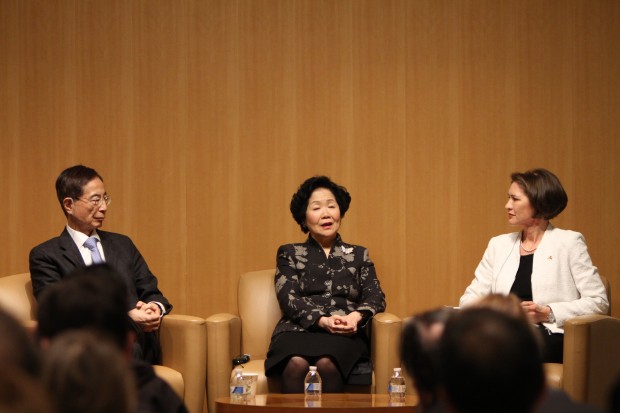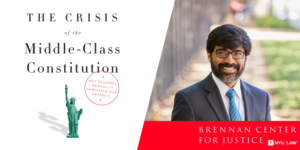
Former founding Chairman of the Democratic Party of Hong Kong, Martin Lee, and former Chief Executive of Hong Kong, Anson Lee, participate in a panel at the National Endowment for Democracy on April 2, 2014.
For almost 40 years, Martin Lee has been promoting democracy in Hong Kong, The South China Morning Post reports. He helped draft Hong Kong’s Basic Law: the city’s mini-constitution that ensured the former British colony would enjoy a high degree of autonomy for 50 years after it was handed back to China. He’s also the founding chairman of the United Democrats of Hong Kong, predecessor of the largest pro-democracy party now in the city’s legislative council. In a recent interview with the Post, Martin [a winner of National Endowment for Democracy’s 1997 Democracy Award] said he believed “the whole world will have democracy” and that “democracy will arrive in China” even if it is the last country to adopt it.
Nationalist oligarchies like China and Russia, also called state capitalist or authoritarian capitalist regimes, have as their central feature the fusion of economic and political power, argues Ganesh Sitaraman, a professor of law at Vanderbilt, co-founder of the Great Democracy Initiative, and author, most recently, of The Crisis of the Middle Class Constitution.
 Democracies entangled with nationalist oligarchies must also diversify their economic relationships, seeking out opportunities to build bridges with other democracies, in order to counter the political influence nationalist oligarchies might have—and to strengthen their resilience in the event of economic conflict, he writes for The American Prospect. This means deepening interdependence with other democracies, strengthening democratic alliances, and helping allies disentangle themselves from nationalist oligarchies as well.
Democracies entangled with nationalist oligarchies must also diversify their economic relationships, seeking out opportunities to build bridges with other democracies, in order to counter the political influence nationalist oligarchies might have—and to strengthen their resilience in the event of economic conflict, he writes for The American Prospect. This means deepening interdependence with other democracies, strengthening democratic alliances, and helping allies disentangle themselves from nationalist oligarchies as well.
But current U.S. foreign policy isn’t concerned with the internal affairs of other nations, or with trying to democratize them, a former official told The New Yorker: “The U.S. has values domestically, but….. If it advances your interests to work with another country, then do it.”
Elsewhere in Asia….
Taken together, the succession of major elections in key countries over the course of a year show a mixed picture for democratic trends in Southeast Asia, notes Amy Searight, a senior adviser and director with the Southeast Asia Program at the Center for Strategic and International Studies (CSIS) in Washington, D.C.
Record numbers of votes are being cast, and civilians are returning to govern in places like Thailand and, several years ago, in Myanmar; cracks are appearing in the region’s most robust democratic systems Indonesia and the Philippines, and Thailand, previously a standard-bearer, is trending backward. Myanmar, once a source of hope and inspiration as it began to transition to democracy with its historic election in 2015, now stands as a cautionary tale of how democracy can unleash intolerance and violent repression against an oppressed minority.
“Only in Malaysia are green shoots appearing as we approach the one-year anniversary of the landslide election that brought democracy and hopes for reform and enduring democratic norms,” she adds.







